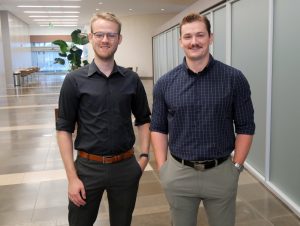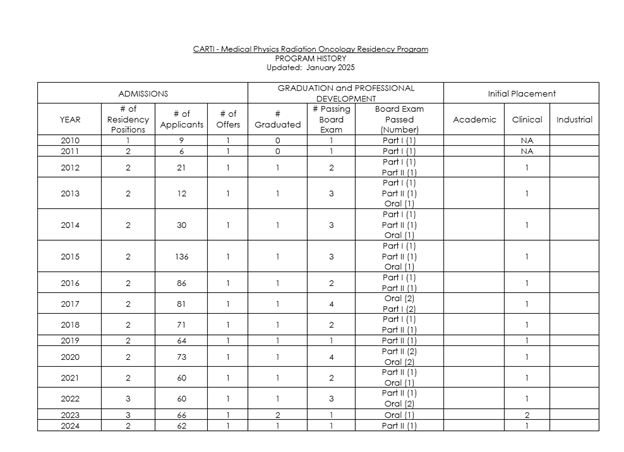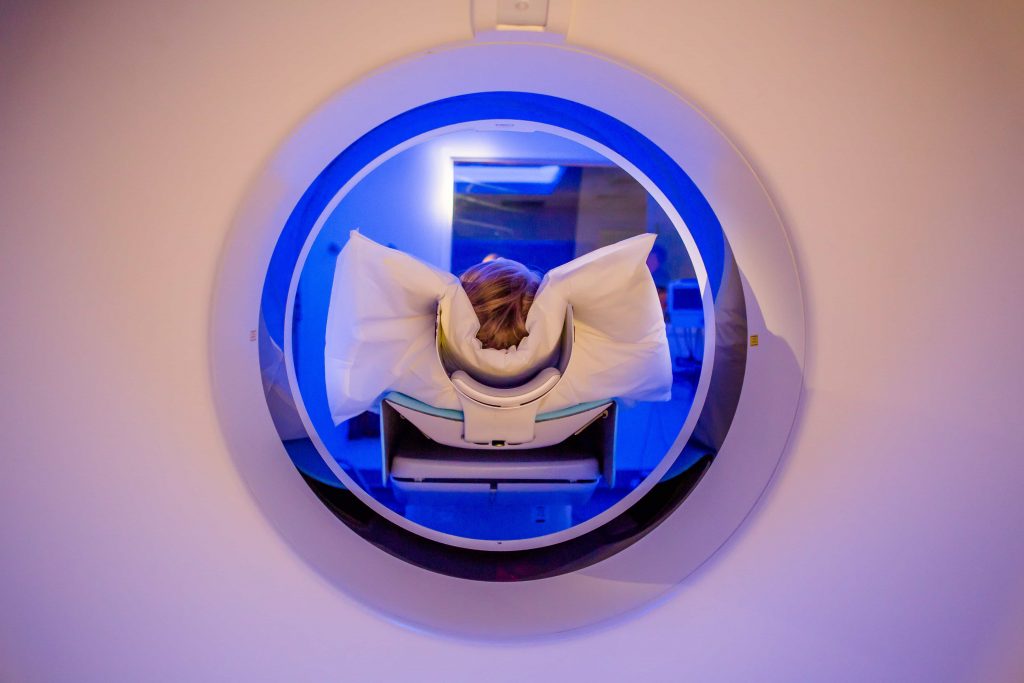We set high standards for cancer care – now and for the future.
That is why CARTI is proud to offer accredited training, including our Radiation Therapy Program and our Medical Physics Residency Program.
RADIATION THERAPY PROGRAM
CARTI offers a one-year educational program to meet the demand for qualified radiation therapists. The program is a continuous resource for well-educated, quality-oriented, professional radiation therapists.
CARTI’s Radiation Therapy Program is accredited by the:
Joint Review Committee on Education in Radiologic Technology
20 North Wacker Drive, Suite 2850
Chicago, IL 60606-3182
Phone: 312.704.5300
Fax: 312.704.5304
www.JRCERT.org
mail@jrcert.org
The program’s current award is 8 years. General program accreditation information and the current accreditation award letter can be found here.
Mission Statement
Our mission is to provide competent and compassionate entry-level radiation therapists to meet the needs of today’s changing health care community in an educational atmosphere of distinction.
A Tradition of Excellence
The performance of the program is demonstrated through program goals, student learning outcomes and program effectiveness data as defined by the Joint Review Committee on Education in Radiologic Technology. Effectiveness data for the programs is available at the following links. This information can also be obtained at https://www.jrcert.org/programs/central-arkansas-radiation-therapy-institute-carti/.
Goals and Student Learning Outcomes
Admissions/Applications
Students are selected on the basis of their applications, official transcripts, professional references, interviews and within the limits of the program’s student capacity. Please keep in mind that selection for the program is highly competitive. CARTI is unable to select every applicant due to limitations of program capacity and availability of clinical space.
Program Brochure and Admission Requirements
Application for Admission Form
For more information or questions concerning the radiation therapy program, please email the CARTI Education Department at Tiffany.Young@CARTI.com or call 501.660.7621 or toll free at 1.855.552.2784 ext. 7621.
MEDICAL PHYSICS RESIDENCY PROGRAM
Each year, CARTI offers a Medical Physics Radiation Oncology Residency Program to prepare students entering the field of medical physics. This program is CAMPEP accredited. The 24-month program is strongly clinical and professional, not didactic. CARTI offers the resident a dynamic clinical learning environment with a vigorous and aggressive adoption of new and proven technology.
Meet the Residents

- Ian, M.S.
First Year Resident
Georgia Institute of Technology, MS, Medical Physics, 2024
University of Texas at Dallas, BS, Physics and Applied Mathematics, 2022
Fun Facts: When I’m not at work, you might find me hiking, biking, camping, or trying a new restaurant in the area.
- Rob, M.S.
Second Year Resident
East Carolina University, MS, Medical Physics, 2022
East Carolina University, BS, Physics and Biology, 2019
Assistant Radiology Physicist, Banner MD Anderson Cancer Center, Loveland, Colorado
Fun Facts: I’m a triplet, I hate pickles and I love the outdoors
Admissions
Pre-Requisite Requirements: Applicants must satisfy the following criteria in order to be considered for acceptance into the residency program.
- Graduate of a CAMPEP approved Medical Physics program with a master’s or doctoral degree
- Graduated with at least a 3.0 cumulative overall GPA
- Meets CARTI employee requirements
Application Process
CARTI is participating in the AAPM Medical Physics Residency Application Program (MP-RAP) and MedPhysMatch.
Please see the following website for more information: https://mprap.aapm.org/ and https://natmatch.com/medphys/
The position will be posted by November 1st of each year.
Number of Residents
The physics residency program is designed to handle a maximum of 2 residents. One resident is accepted per year through the MATCH Program.
New Resident Orientation
Upon entering the program, the resident will be given a residency handbook that covers all resources, opportunities, and requirements for successful completion of the CARTI residency program. The program and all staff physicists will always be available to answer questions and give clarification, should the resident request it. In addition, the resident will be given his/her own CARTI employee manual.
During the two-year residency program, continuing education will be required on a monthly basis. This continuing education is the same as that required of CARTI employees and covers areas such as radiation protection, patient confidentiality, infection control, and clinical expectations.
Evaluation of Resident Progress
Residents are monitored throughout the program by the program director. Residents will meet with the program director, at least once a month. In addition, at the completion of each rotation the resident will receive written feedback on his/her performance. By the completion of the residency, the physics resident is expected to be able to perform all radiation oncology physics functions.
Financial
The medical physics residency position at CARTI will be a full-time salaried new employee. As such, this position will qualify for the same benefits as any other new employee, including health and dental insurance plans, CARTI holidays, paid time off, 403(b) tax deferred annuity and retirement plan (the retirement plan is not fully vested for 5 years). This position also includes paid registration, travel and lodging, and meals to one meeting or workshop, as well as membership dues to one related professional society. Transportation to CARTI sites outside of Little Rock is provided by CARTI, or reimbursed at the current mileage level set by CARTI.
All other financial burdens are the responsibility of the resident, including all travel and living expenses, out-of-pocket health care, books, supplies, uniforms/lab coats, etc.
REQUIREMENTS FOR COMPLETION
Training Requirements
The requirements for completion of the 24-month residency will be the demonstrated ability to perform independently all tasks generally recognized as fundamental clinical physics duties, as outlined in Task Group 249 of the AAPM. The objective of the first year will be attainment of the ability to manage, with necessary supervision from the CARTI clinical physics staff, the broad range of clinical duties necessary for the daily operation of a radiation oncology clinic; primarily the safe planning and delivery of radiation therapy to cancer patients, state licensing maintenance, radiation safety issues, etc. The objective of the second year will be to build on the first year and to develop areas of specialization and expertise, and to develop greater level of responsibility and independence. One advantage that CARTI offers residents is its multiple (7) clinical sites, each staffed with its own radiation oncologist(s), dosimetrist(s), therapists, and administrative staff. It is expected that in the second year of the residency, the resident will join the clinical travel rotation with the other staff physicists. This will enhance the resident’s ability to work independently, while at the same time having access to support from the other physics staff. It is expected that the resident will attend or participate in departmental and clinical conferences, in services and e-learning programs which have direct or indirect educational or clinical relevance. Examples of ongoing conference include weekly physics staff meetings, chart rounds, stereotactic conferences, and radiation oncologist case reviewed; as well as monthly medical physics journal club and e-learning clinical programs.
Clinical Rotations
- Program Orientation
- Introduction to the Treatment Process
- External Beam Treatment Planning and Delivery (non-SRS/SBRT)
- External Beam Dose Calculations
- Stereotactic Radiosurgery & Radiotherapy and Stereotactic Body Radiation Therapy
- Brachytherapy (LDR & HDR)
- LINAC TPS Acceptance & Commissioning
- LINAC QA
- Radiation Detection
- Nuclear Medicine & Imaging in Radiation Oncology
- Protons, TBI, TSET, and other Special Procedures
The method for evaluations of the resident’s performance in each clinical rotation will be determined by the CARTI physics staff. Possible methods for evaluation will be:
- Oral exams
- Written exams
- Performance of a specific task (e.g. independent performance of annual calibration)
- Oral presentations by the resident to physics or other staff
- Journal article reviews
PROGRAM ADMINISTRATION
Role of Program Director
The program director is Paul Bruce, M.S., DABR.
The program associate director is Ashley Matsushita, M.S.
The program director will be responsible for maintaining routine documentation for compliance with CAMPEP certification, directing annual and quarterly reviews of the residency program with the residency advisory board and conducting monthly reviews with each resident to assess progress through the program. The program director will also delegate mentoring responsibilities to the staff physicist on a monthly rotating basis.
Role of Admissions Committee and Medical Physics Review Board
The following standing committees will meet as needed, but at least annually.
- Admissions Committee
- Medical Physics Residency Review Board
The admissions committee will meet starting in December of each year to begin the review process and to interview new program applicants. It will continue to meet as necessary until an offer has been made and accepted by an applicant. The Medical Physics Residency Review Board will review the entire program annually and make changes to the curriculum, rotations, and competencies based on feedback from the faculty, residents, and other staff. Quarterly reviews will be conducted by the review board to address any pressing matters that may arise.
Committee Members Include:
- Paul Bruce, M.S., DABR
- Ashley Matsushita, M.S.
- Scott Yakoubian, M.S., DABR
- Joe Grant, M.S., DABR
- Vance Keeling, M.S., DABR
- Regan Hime, M.S., DABR
- Erika Brescia, M.S., DABR
- Cathy Large, M.S.
- Dr. Christopher Pope, M.D.
- Micheal Johnson, CMD
- Megan Watson, CMD
- Misty Tholl, CMD
- Kim Moix
Equipment and Facilities
The resident will use all CARTI facilities, with occasional travel to satellite centers. Technology available includes:
- Actively involved in AAPM Multi-Institutional Journal Club
- 6 Varian TrueBeam LINACS
- Varian VitalBeam LINAC
- 2100C-series LINAC
- Varian Identify SGRT System
- Accuray CyberKnife S7
- Varian BRAVOS Afterloader
- I-125 LDR Prostate Implants
- 6 Philips Big Bore CTs
- 2 Siemens SOMATOM go.Sim CTs
- Varian Eclipse, Philips Pinnacle, BrachyVisions, Variseed, & Precision TPS
- ARIA & MOSAIQ Record and Verify System
- MIM
- Radformation: ClearCheck, ClearCalc, AutoSegmentation
- Sun Nuclear: ArcCHECK, MapCHECK, SRS MapCHECK, StereoPHAN, IC Profiler, SRS Profiler, DQA3, SunCHECK, SunMACHINE
- Adaptiiv & Raised 3D Bolus Printer
- Pentaguide SGRT & Mobius Phantoms
- SNC 1D & IBA 3D Water Tanks
CARTI Radiation Oncology Locations in Arkansas
- Little Rock
- North Little Rock
- Conway
- Searcy
- Pine Bluff
Educational facilities include conference rooms with video teleconferencing at each site. Office space for resident’s use is provided. There are at present no formal library facilities within the physics department; however, the department purchases necessary and useful textbooks and reference materials and several online subscriptions to journals which are made readily available to department members, including residents. In addition, the extensive personal libraries of the department members are available for sharing. The resident will have ready access to the internet and other electronic resources.
Program History: Past and Current Residents

Contact Paul Bruce at pbruce@CARTI.com or Ashley Matsushita at Ashley.Matsushita@CARTI.COM for more information.



